DOUBLE-FEATURE: Runaway - Westworld
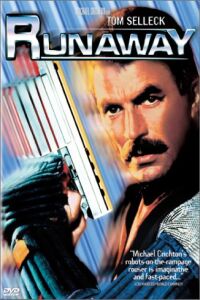
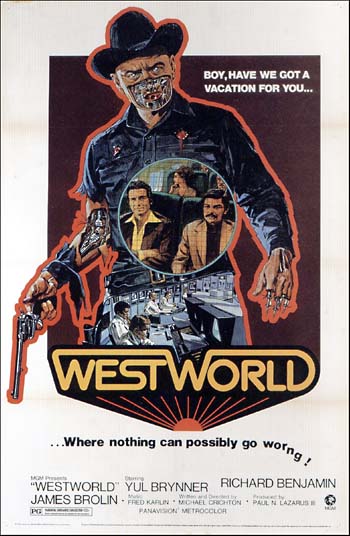
As a new postdoctoral fellow in the HUMlab here at Umeå University, HUMlab director Partik Svensson asked if I wanted to arrange a viewing of a documentary film I made a few years back. Called Love Machine, the film considers the social and philosophical implications of robots entering into human social relations like friendship, love and sex. My answer was that what I really wanted to do was organize an entire film series about robots. As my current research is on Robot Ethics, and especially military applications, I also wanted to design a film series that included these themes.
Briefly, my work on Robot Ethics is concerned with multiple approaches to the issues, but is ultimately theoretical and pragmatic. First it seeks to understand the design issues that engineers might face, and how their professional ethics might need to be enhanced to deal with new issues raised by autonomous technologies like robots. Second, it seeks to understand how the use of robots for fighting wars, or policing civilian populations, in which robots are actually designed to use lethal force against humans, could change our fundamental conceptions of the nature of warfare and policing. Third it seeks to understand what basis there might be for treating robots as moral agents, legal agents, economic agents, or as bearers of intrinsic rights. Fourth it seeks to undertand how social and cultural issues are reflected in, or displaced to, certain robotic technologies. How we treat the elderly, how we fight wars, and how we seek companionship are deeply human experiences and decisions, yet they are being transferred to machines. It seems to me that many of our intuitions about these issues have been powerfully shaped by cultural images, specifically science fiction literature and film. As such, I think it is important to review the most signficant of these cultural images.
This is the result, a filmseries entitled "Love, War &
Robots" that is divided into three parts:
Part I: Robots Out of Control
Part II: Automatic Warfare
Part III: Love Among Machines
The basic format and schedule will be to watch the films every Friday at 3:30pm in the HUMlab. It is hoped that people will come to multiple films in the series, and will be wiling to stay after the film to discuss them in relation to the themes of the series. If there is sufficient interest, these discussions can be continued at a nearby pub. We will take off several weeks for June and July for the break, and resume in early August.
Some of the shorter and theoretically thinner films have been combined as "Double Features", and so there will be a short break in between these. The longest double feature will be 212 minutes in total, which is fairly long, but only a bit longer the than longest single feature, A.I. which is 146 minutes. But even then we should be finished at a reasonable time in the evening.
In Part I: Robots Out of Control I wanted to select films that addressed the dangers of robots behaving badly. In my research on robot ethics, it seems that many of the problems are really about how to safeguard the public from unintended or unexpected consequences of various technological designs. The idea of technology gone out-of-control is a classic story line, which usually includes the elements of the mad scientist, full of hubris, and the predictable downfall. It is in this sense a modern derivative of classical Greek tragedy. Unlike classical tragedy, however, the downfall is not due to the gods, or fate, but to the evil intentions of the scientist, usually greed, or the political aspirations of modern militarized nation-states, or society itself.
Also unique to robots, as opposed to other potentially disaterous technologies (such as, e.g. the unsinkable ship in Titantic) is the kind of autonomy they are granted, or aquire through accident. With all of the robots in Part I the robots aquire their autonomy both unexpectedly and against the will of most, if not all, people. In The Terminator, we do no actually witness this, but it is a significant plat element that the Skynet defense system becomes self-aware and attacks humanity. In Runaway and Westworld the rather simple robots used for household chores or for amusement park recreation, respectively, begin to malfunction in dangerous, and vaguely autonomous ways. In RoboCop a human is transformed into a robot, only to recover his autonomy and free will, in order to battle a well-behaved robot following the orders of evil masters. And in Demon Seed we find a "smart house" that is taken over by a computer intelligence that has become self-aware and interested in procreation. These themes are permutated in Parts II and III, with the concepts of control, desire, autonomy, love, violence, rationality and technological hubris taking on various formulations.
Part II: Automatic Warfare considers the precursors to the Skynet of The Terminator, namely the automated command and control systems for nuclear weapons systems put in place during the Cold War. The conceptual framework within which these systems were developed were heavily influenced by the scientific movement called Cybernetics which blended together information theory, operations research, computation, cognitive neuroscience, mathematics, robotics engineering, and touched upon many other fields. Norbert Weiner, who coined the term "Cybernetics," wrote extensively on the need for the rational control of nuclear arms. A co-founder of the movement, John von Neumann, was a key scientist in the Manhattan Project to develop the first nuclear bombs, where he did the complicated hydrodynamics to design the shaped charges required to detonate the device. He went on to design the first stored-program digital computer architecture, upon which most modern computers are still designed, and to serve as a Commissioner of the Atomic Energy Commission. Along the way he devised the mathematical theory of automata, and self-replicating automata, and game theory, which became instrumental in the development of nuclear deterrence strategy, which figures centrally in all of the films in this section. He is also considered to be the basis of the iconic Dr. Strangelove character (which imitates his Hungarian accent), and certainly of Walter Mathau's character in Fail-Safe.
Apart from the strong historical links between nuclear weapons, computers, and robots via cybernetics, my interest in these films lies in the nature of Cold War discourse about how nuclear war might be, or ought to be fought. While on its face absurd, there were powerful interests in having these weapons, and in finding rational means for managing and using them. For the most part these films are about the fragility of even the best designed, and logically though out systems. The hubris is to think that one can use logic and rationality to completely eliminate flaws. Hubris is the ultimate human flaw--the doubt that one has flaws. Here the flaws tend to be the lack of imagination, the failure of rational systems to deal with irrational behavior and thus to ignore it, and the faith that one is dealing with a closed system when the reality is that all systems are open systems (except for those in the imagination of mathematicians). While the treat of nuclear war was and still is real, and is potentially the end of the entire human race, there is a particularly dramatic urgency to confronting these issues. While robots share in the military strategies and control regimes over their autonomy, their use may not be so immediately urgent. However, with the existence of these semi-autonomous nuclear systems, the potential of a self-aware computer, unaware hacker, military officer gone mad, or simply a glitch in the system, to wield that terrble power becomes a genuine concern.
Part III: Love Among Machines returns to the more intimate side of being human, love and romance. Almost as much as war, love is a principle theme in robot films and literature. This tradition goes back again to classic Greek literature, where we find Pygmalian bringing to life his ideal love, an ivory statue named Galatea, with tragic results. Perhaps because we see in human-like robots the power to re-create ourselves in our own image, or without flaws, these stories remind us that there will always be flaws. From another perspective, the moral is that the flaws are what make us special, because they are so human, and thus they are the things upon which love and affection are often fixated.
For this part I chose the films which demonstrate the great complexity that comes with trying to replicate human emotion. One could argue that the vast body of literature itself, seen as an expression of human psychology, emotion and experience, in its many variations, is an embodiment of these things. But in externalizing these inner experiences, and even more so by making these animate, or even autonomous, in a robot, we find out something more about ourselves that we did not quite realize. In this sense the robot is a kind of mirror, offering insight into the human experience. Blade Runner is undeniably the best exemplar of this, with the protagonist Deckar trying to come to grips with his own humanity as he kills androids, only to fall in love with an android.
Also in Part III is my own documentary, Love Machine. In earlier drafts of the the lists of films, there were more documentaries, but this is the only one I kept, both because it was what instigated the series, and because I wanted the opportunity to discuss it in the context of these other films. It touches on various ethical issues, but more so on social issues--what does it mean for our society to care for the elderly with robots instead of people? That more and more people find sexual relief through the impersonal internet, than through human contact? etc. I think the film makes a good counterpoint to Spielberg's A.I. Artificial Intelligence which seeks to grapple the issue of love in machines, but in a radically different, and distinctly Hollywood fashion. I've also tried to lighten things up a bit with some romantic comedies about robots and workplace automation. I've also included Ghost in the Shell 2: Innocence in this part. Japanese anime is rife with all sorts of robots, but these mainly occupy the fantasy genre. Ghost in the Shell and its sequal standout not only for the quality of their animation, but their admittedly futurist realism. I chose the second in the series because it focuses on a sex-worker robot that's gone out of control, and thus ties back to the themes of Part I.
Below is the schedule of films. I have included some description of each film, and why I chose it, as well as critical information and links to more information on IMDB. I have also included images of the original movie posters and sometimes DVD covers, as I find this imagery to be highly culturally significant even when it does not appear as such in the film. Partly this stems from an interset in how films in these genres are marketed, which also shapes how the films are made, such as how novels are reinterpreted as screenplays. Moreover, the movie posters are themselves cultural icons. This is especially clear in the posters from Part I which almost all feature a a highly masculine image carrying a gun, and several in nearly the same pose.
PART I: ROBOTS OUT OF CONTROL
May 11
DOUBLE-FEATURE: Runaway - Westworld


Runaway (1984) directed by Michael Crichton, 99 minutes
http://www.imdb.com/title/tt0088024/
Westworld (1973) directed by Michael Crichton, 88 minutes
http://www.imdb.com/title/tt0070909/
Michael Crichton is perhaps best known as the writer of Jurassic Park and The Lost World. Through the 1970s and 80s he directed a series of technology themed suspense films, including these two that feature robots. Runaway is not a particularly good movie, but it does consider a future in which simple "helper" robots are common, and their tendency to malfunction in unpredictable and dangerous ways requires a special police "Runaway" unit, of which Tom Sellek is an officer. This basic cop drama sets Sellek against an evil roboticist played by Gene Simmons, the former lead singer of the costumed rock band Kiss.
Westworld is by far the better film, starring Yul Brenner as a malfunctioning robot in a wild west themed amusement park populated by robots. It led to the sequel Futureworld, and Crichton is working on a remake due out in 2009. It was also the subject of an extended parody in a Simpsons episode. The film exploits many of the elements of the Western genre as the culminates in a "showdown" between humans and robots.
May 18
DOUBLE FEATURE: The Terminator - Robocop
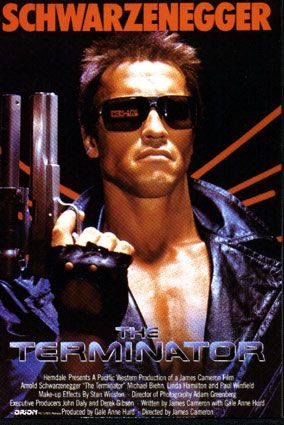
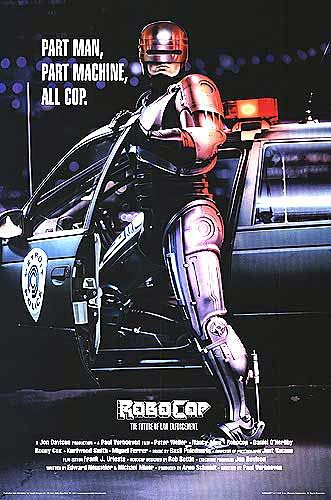
The Terminator (1984) directed by James Cameron, 108
minutes
http://www.imdb.com/title/tt0088247/
RoboCop (1987) directed by Paul Verhoeven, 102 minutes
http://www.imdb.com/title/tt0093870/
No robot-themed film series would be complete without these two classics, though in each case the stars are really "cyborgs", part organic and part machine. The Terminator is really a robot assassin with human flesh grown over it to hide its true identity, while RoboCop was a regular person who is rebuilt with robotic parts and mind-controlling computers as a prototype for a new robotic police officer.
While set in the present day 1984, The Terminator envisions a world war in 2029 that is started by automated weapons systems when they become self-conscious. Beyond this eventual revolt of the machines and their intention to enslave or destroy humans, it offers little commentary on the nature and risks of technology (though its sequel dwells more heavily on these themes and takes a more amibvalent stance towards the robotic technology). It does offer a suspenseful action film, with its classic imagery and dialogue. While Arnold Schwartzenegger made his Hollywood debut in the documentary Pumping Iron, this is the film that established his career and for which he is best remembered. James Cameron wanted him for this role because of the "machine-like" angles of his body and the machine-like dedication to weightlifting it took to create.
RoboCop is a film rich in pschyological depth and social commentary. Not only does star Peter Weller present a compelling character who must deal with his unnatural bodily and mental transformations, but who must also come to grips with the coercive power of big business and corrupt government and his role in their plans. The film comments heavily on the influence of big money on the politics of urban planning and social services, the relationship between drugs, drug-wars, and the escalating violence of inner cities (1987 was the height of the crack-cocaine epidemic in the US). There are also more subtle and clever critiques of consumer culture, TV, and automobile/gas dependency that litter the film. Despite its (near)futurism the world is quite familiar, and the social framework and reactions to the use of robots for law enforcement is portrayed in a highly realistic way.
When it was released, RoboCop was heavily criticized for its graphic violence, though The Terminator was not. It should be interesting, however, to compare the realism in Verhoeven's use of violence and its implicit social critique to Cameron's use of violence as cinematic spectacle to create a relentlessly single-minded monster and object of fear.
May 25
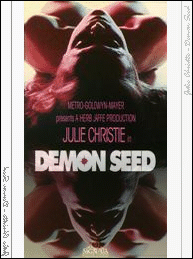
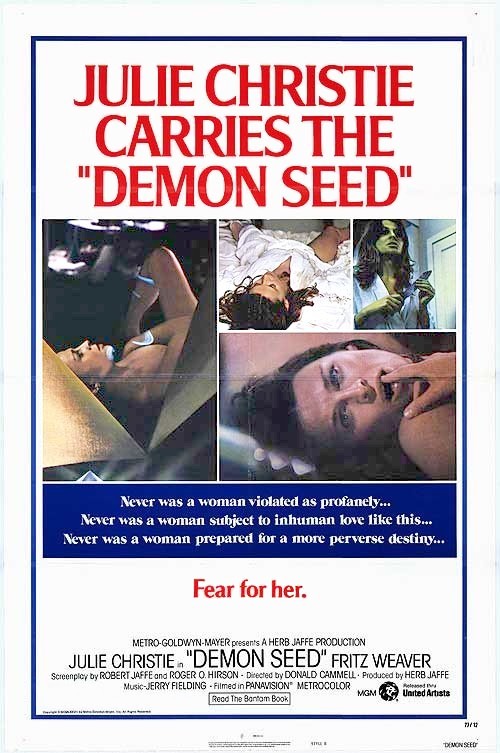
Demon Seed (1977) directed by Donald Cammell, 99 minutes
http://www.imdb.com/title/tt0075931/
I've never actually seen this movie, but it seems to be the only film around about the dangers of "smart houses," set in a futuristic 1995. It is based on a novel that Dean R. Koontz wrote in 1973, and rewrote in 1997.
Here is a short review:
http://www.thespinningimage.co.uk/cultfilms/displaycultfilm.asp?reviewid=965
PART II: AUTOMATIC WARFARE
June 1
DOUBLE FEATURE: Fail-Safe - Colossus: The
Forbin Project
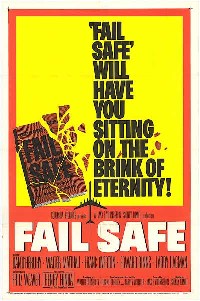
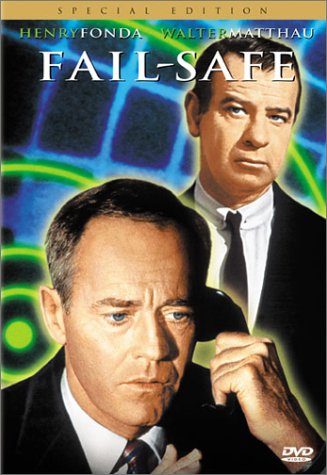
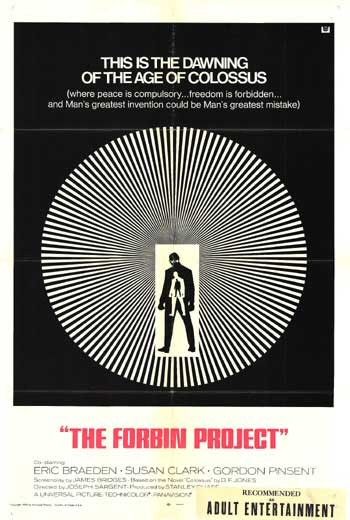
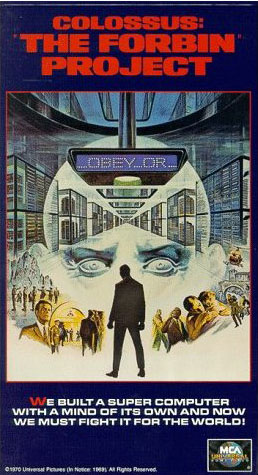
Fail-Safe (1963) directed by Sydney Lumet, 112 minutes
(black&white)
http://imdb.com/title/tt0058083/
Though not as well known as Dr. Strangeleove, Fail-Safe came out a year earlier and was the first major Hollywood film to contemplate nuclear war and how it might occur "accidentally." It stars Henry Fonda as the US President, and Walter Matthau as a mathematician/strategy university professor. The film feels almost like a stageplay, and dwells on the drama of the choices, beliefs, motives and (mis)trust of the characters. It was remade by George Clooney as a live-broadcast TV show starring Richard Dreyfus in 2000, which received critical acclaim though I have not seen it yet.
Colossus: The Forbin Project (1970) directed by Joseph
Sargent, 100 Minutes
http://imdb.com/title/tt0064177/
June 8
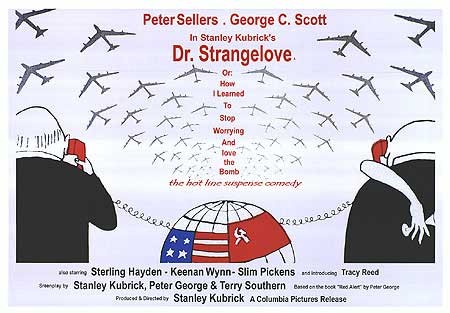
Dr. Strangelove, Or: How I learned to Stop Worrying and Love
the Bomb (1964) directed by Stanley Kubrick, 96 minutes (black&white)
http://imdb.com/title/tt0057012/
This is one of the greatest ever films made, period. It is tour de force of writing, cinematography, acting, political commentary, and dark humor. Peter Sellers plays 3 different roles (Kubrick wanted him to play 5) including the iconic mad scientist Dr. Strangelove. Terry Southern co-wrote the script, and later co-wrote Easy Rider. The movie really speaks for itself better than anything I could say about it. It effectively captures multiple layers of the "strange love affair" of power, technology, control, nuclear arms, and madness. MAD is, of course, the nuclear deterrence strategy of Mutually Assured Destruction, which counterintuitively assumes that those with control of nuclear weapons are not, in fact, mad.
The public reaction to Dr. Strangelove and Fail-Safe were so strong that the US military began a large-scale review of its command-and-control infrastructure as a result. The RAND Corporation published a now de-classified report of the "Strangelove-Failsafe Problem" that included contributions from intelligence analyst Daniel Ellsberg, who a few years later would leak the Pentagon Papers (the US military review of policy and strategy failures in Vietnam) to the press. Nixon ultimately resigned as a result of the Watergate burglary cover-up, but also because of revelations that he ordered a secret break-in at the office of Ellsberg's psychotherapist in an attempt to find material to blackmail him with.
June 15
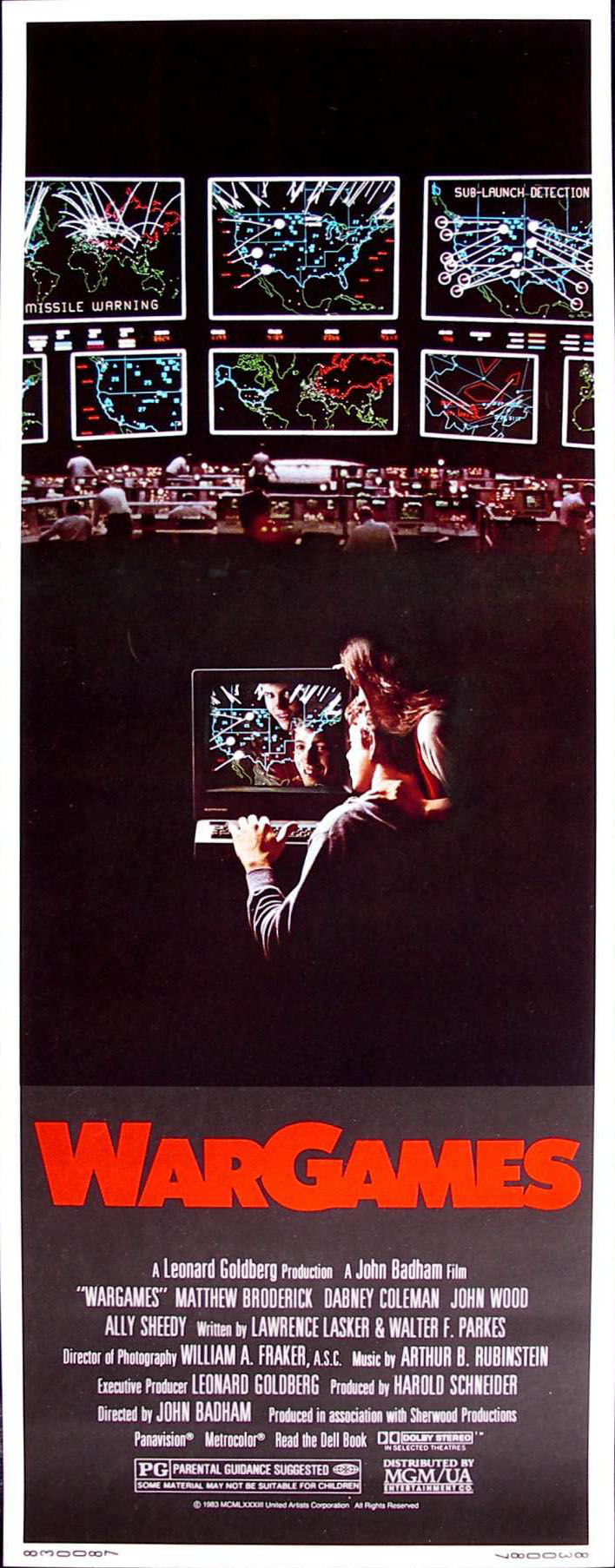
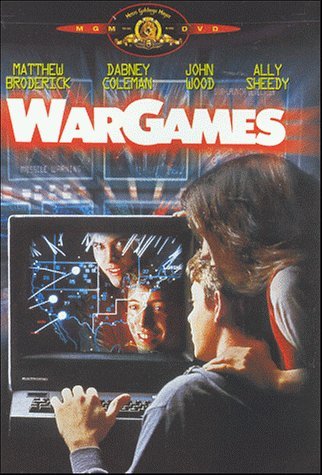
War Games (1983) directed by John Badham, 114 minutes
http://www.imdb.com/title/tt0086567/
NO FILMS
June 22 - July 27
PART III: LOVE AMONG MACHINES
August 3
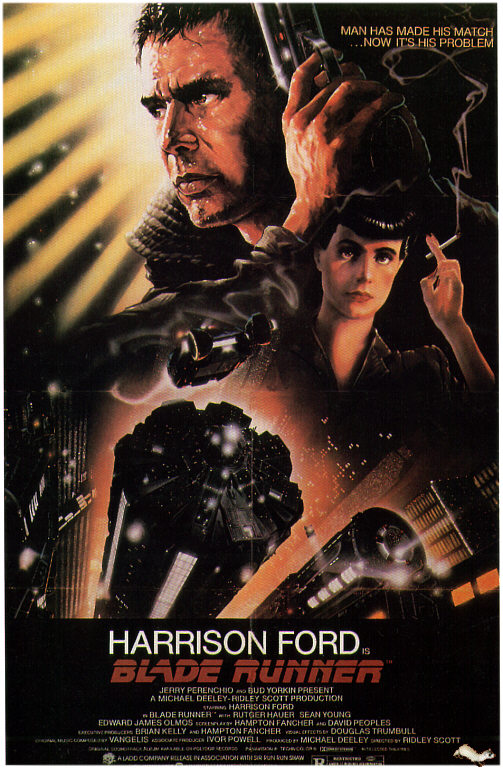
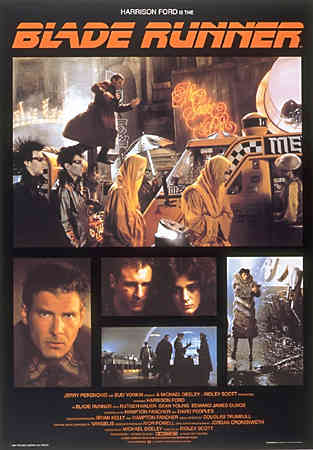
Blade Runner (1982) directed by Ridley Scott, 117 minutes
http://www.imdb.com/title/tt0083658/
August 10
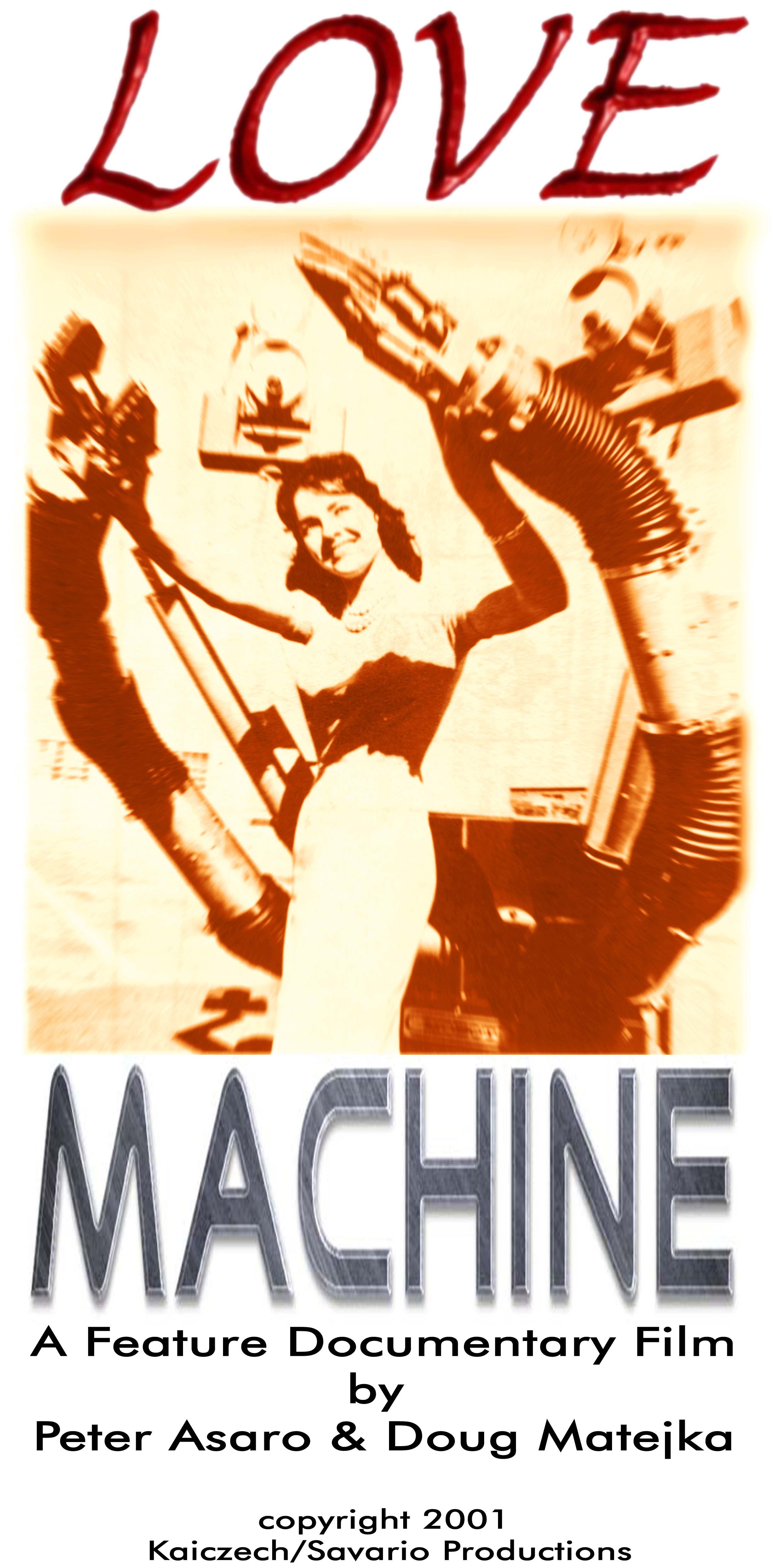
Love Machine (2001) directed by Peter Asaro, 110 minutes
August 17


A.I.:Artificial Intelligence (2001) directed by Steven
Spielberg, 146 minutes
http://www.imdb.com/title/tt0212720/
A.I. is a movie that I love to hate. It was a movie that I waited about 10 years to be completed, as I had heard that Stanley Kubrick was working on it in the early 1990s, when I first became interested in the field of artificial intelligence, and was becoming aquainted with Kubrick's films. After Kubrick's death, Steven Spielberg took over the film. Needless to say, dispite his many talents and the production values, the film lacks the dark humor and human mystery that Kurbrick would certainly have encapsulated in the film. Even the obvious vestigaes of his script, featuring Gigilo Joe, and a trip to a hyper-sexed city of pleasure, while still present feel glossed over by Spielberg, who exchanges an uncomfortable investigation into human sexual desires for a story that places mother-child love as the foundation of humanity.
This film came out as I was editing my own documentary on robots, love and emotion. At first I though maybe Spielberg had beaten me to the chase, but after seeing it, I was unimpressed by the shallowness of human emotion it considers. At least, it largely ignores a large number of the social and emotional exchanges between the robots and humans that actually appear in the film, in order to focus on the one "special" robot boy. Still, after further viewings it is possbile to find in the details of the boy's experience of love a complicated and often contradictory set of relations and experiences. I've written a longer piece on this film, which you can find here (Warning-there are some spoilers if you haven't seen the film yet):
August 24
.jpg)
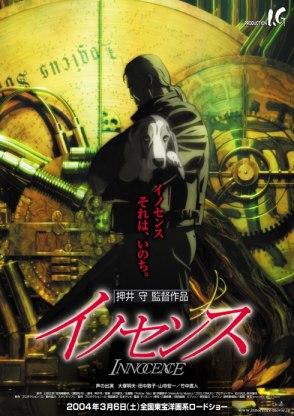

Ghost in The Shell II: Innocence [Inosensu: Kokaku Kidotai]
(2004) directed by Mamoru Oshii, 100 minutes
http://www.imdb.com/title/tt0347246/
This is the sequal to the 1995 film, Ghost in the Shell, which is a classic of Japanese anime. The first film follows some police officers who are pursuing a highly sophisticated hacker. This sequal follows the same police officers from the first film in a new case, and occupies the same complicated and confusing fantasy world. Even after several viewings of both films, neither plot is completely clear to me, but the major elements are easy enough to discern. However, the powerful visual imagery and music are more than sufficient to keep the viewer's attention through both films. In Innocence we find our detectives inverstigating an android sex-worker that has killed one of its clients. Of course robots are not supposed to be capable of such things, and so their investigation shines a light into the seedy underbelly of its futuristic cyberworld, and raises questions about both the nature of human and machien emotion, as well as the ethical responsibilities between them.
August 31
DOUBLE FEATURE: Desk Set - Making Mr.
Right
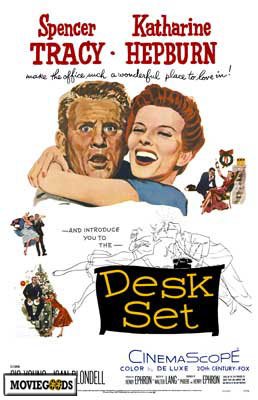
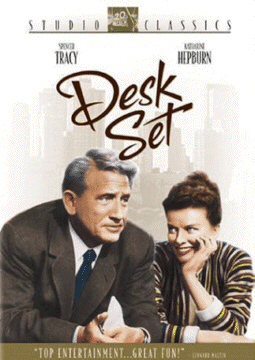
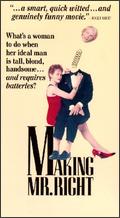
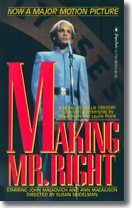
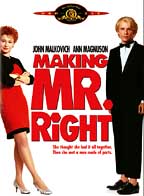
Desk Set (1957) directed by Walter Lang, 103 minutes
http://www.imdb.com/title/tt0050307/
Making Mr. Right (1987) directed by Susan Seidelman,
98 minutes
http://www.imdb.com/title/tt0093477/
Desk Set has a double meaning here, referring both to the tools one has on a desk (pens, ruler, letter-opener, stapler, etc.) and a social group that defined by their office (as the Jet Set would be defined by travel and wealth). It is the eighth in a series of nine films that starred Spencer Tracy and Katherine Hepburn (one of the classic Hollywood duos), and was their first film together in color. It is a playful romantic comedy, set against the installation of a new computer system in an office workplace. Spencer Tracy plays the computer installer. It offers both an historically situated perspective on office culture in the US in the 1950s, as well as a somewhat timeless commentary on the social reorganization that surrounds the introduction of new technologies in the workplace. Thus it is not really about robots, but it is about social change as a result of the automation of human labor. I've included it in this section because it entangles romance into this process.
Making Mr. Right stars John Malkovich in a double-role as both mad scientist, and his own android copy of himself. It is also a romantic comedy, with his costar being hired as an assistant, who has difficulty distinguishing the real doctor from the robot. The plot and script are not particularly strong, but Malkovich is reliably brilliant in both roles, and the film succeeds in challenging our intuitions about machines, humans and emotions, primarily by focusing on love and romance.
ALTERNATE/FUTURE FILMS
Metropolis
Fast, Cheap & Out of Control
Robot Stories
RoboWarriors (Recent History Channel Documentary)
Tetsuo, The Iron Man
Short Circuit
D.A.R.Y.L
The Iron Giant
The Stepford Wives
2001: A Space Oddessy
SimOne
I, Robot
Conceiving Ada